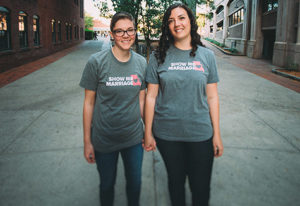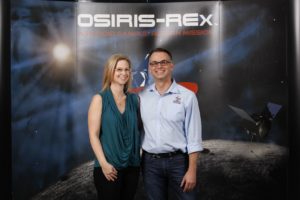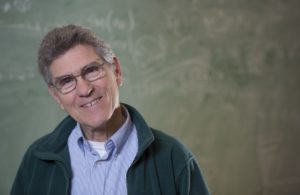Members of the all-male a cappella ensemble The Stereotypes sing their hearts out for Valentine’s Day.
Love is in the air … and the lab … and the lecture hall. In celebration of Valentine’s Day, The Source revisits some favorite stories about romance, marriage and mating.
Spouse’s personality influences career success, study finds
Did you just get a raise? You may have your valentine to thank. A study from Joshua Jackson, associate professor of psychological and brain sciences in Arts & Sciences at Washington University in St. Louis, suggests the personality traits of one’s spouse may play a role in determining success in the workplace.
Brown School student, alum are first same-sex couple legally married in Missouri

Lilly Leyh-Pierce and Sadie Leyh-Pierce made history when they wed in 2014, holding a celebration under the Brookings Hall archway. The ceremony was led by Anna Shabsin, teaching professor at the Brown School. Today, Sadie Leyh-Pierce is a social worker in the Ritenour School District, and Lilly Leyh-Pierce is a higher education strategy and operations consultant for Huron. Both earned master’s degrees in social work from the Brown School.
From today’s top 100 Billboard songs to ancient Sumerian scripts, human beings have always sung about love. So how have love songs changed across the ages? Have they evolved to reflect society’s understandings of love? Or have we been singing about basically the same things for millennia? Clare Bokulich, assistant professor of musicology in Arts & Sciences, explores these questions and more on the podcast “Hold That Thought.”

On Sept. 8, 2016, as an Atlas V rocket fired up and away from Cape Canaveral, Florida, on a seven-year journey to collect and return samples from the carbon-rich surface of the Bennu asteroid, two 1997 Washington University alumni — Mission chief Dante Lauretta and project data archivist Kate Crombie — sat anxiously watching the liftoff. The husband-and-wife team met while in graduate school in earth and planetary sciences in Arts & Sciences in 1993.
Scientists sniff out female mouse scents that make males frisky
Timothy Holy, the Alan A. and Edith L. Wolff Professor of Neuroscience at the School of Medicine, has identified two chemical scents in the urine of female mice that arouse sexual behavior in males, a discovery that shines a spotlight on how mouse pheromones control behavior. Holy, the big cheese of mice pheromone research, also discovered male mice sing in the presence of their mates.
Couples may miss cues that partner is hiding emotions, study suggests
Think your spouse really wants that box of cut-rate chocolate for Valentine’s Day? Think again. Research from Lameese Eldesouky, a doctoral student in psychological and brain sciences, suggests that even the most blissful of couples in long-running, exclusive relationships may be fairly clueless when it comes to spotting the ploys their partner uses to avoid dealing with emotional issues.

A theoretical physicist reassures the lovelorn
What are odds that you will find your one and only among the billions of people on the planet? Carl Bender, the Wilfred R. and Ann Lee Konneker Distinguished Professor of Physics in Arts & Sciences, breaks down your chances.
Frog love, economics, and the decoy effect
Your bestie is not the only one who always falls for the wrong one. Studies show that even frogs can be irrational when choosing a mate. But Paulo Natenzon, assistant professor of economics in Arts & Sciences, has found a way to restore rationality to the frogs (if not our friends). He explains how in a “Hold That Thought” podcast.